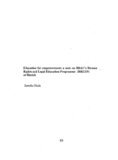| dc.contributor.author | Huda, Samiha | |
| dc.date.accessioned | 2019-12-11T09:27:10Z | |
| dc.date.available | 2019-12-11T09:27:10Z | |
| dc.date.issued | 1996 | |
| dc.identifier.citation | Huda, S. (1996). Education for empowerment: a note on BRAC’s Human Rights and Legal Education Programme (HRLEP) at Matlab. Research Reports (1996): Social Studies, Vol – XIII, 99–110. | en_US |
| dc.identifier.uri | http://hdl.handle.net/10361/13252 | |
| dc.description.abstract | This study attempts to address selected aspects of BRAC's Human Rights and Legal
Education Programme (HRLEP) in Matlab Thana. HRLEP at Matlab began in January
1996 through training of the members of village organizations (VOs) on human rights and
legal education. The major objective of the study was to assess the process of HRLE
training at Matlab and explore the level of interaction between VO members and the
shasthya shebikas (SSs) and Programme Assistant (PA) involved in training. The study
also aimed to elicit the participants' perception of the programme and to evaluate the
contents of the training manual.
Data were collected through direct observation of HRLE training sessions in l 5 villages.
Programme information were collected from HRLE staff at Matlab. Published articles,
manuscripts, annual reports, and research reports on the issue were also used as secondary
material.
It was found that none of the shebikas at Matlab received training manuals (as on l 5 May
1996), rather they were providing training with the help of their notes taken during their
own training. It was also found that some of the VO members were not interested in the
course at the beginning but became interested later on. Credit was found to be an
important factor in motivating enrollment; once they start attending the training classes,
they tended to grow interest in the course and wished to continue. Another important
finding was that some VO members' husbands objected to their participation in the
course. A common objection of their husbands concerned the teaching of Muslim Family
Law, especially the issue of divorce. Hindu VO members demanded that Hindu Law be
included in the course contents as well.
Major recommendations include:
• Teaching manuals should be supplied immediately to the SSs.
• It is suggested that issues such as Hindu Family Law and Laws of Inheritance and
domestic violence be included in the course contents.
• Flip charts used in the course should include more illustrations. The size of the
illustrations should be increased so that each page contains only one picture. Four
separate flip charts can be produced for four different laws.
• A strong follow up system should be developed, so that BRAC members do not forget
what they have learned | en_US |
| dc.language.iso | en | en_US |
| dc.publisher | BRAC Research and Evaluation Division (RED) | en_US |
| dc.subject | Education | en_US |
| dc.subject | Empowerment | en_US |
| dc.subject | BRAC | en_US |
| dc.subject | Human Rights and Legal Education Programme (HRLEP) | en_US |
| dc.subject | Matlab thana | en_US |
| dc.subject.lcsh | Urban poor--Education | |
| dc.subject.lcsh | Education--Experimental methods | |
| dc.subject.lcsh | Education--Study and teaching | |
| dc.subject.lcsh | Law -- Study and teaching. | |
| dc.subject.lcsh | Civil rights | |
| dc.title | Education for empowerment: a note on BRAC's Human Rights and Legal Education Programme (HRLEP) at Matlab | en_US |
| dc.type | Research report | en_US |

